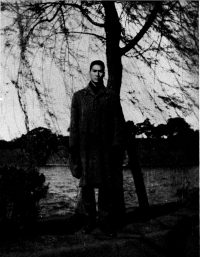Summer begins today, our second in Japan. Japanese colegialas [schoolgirls] have put on their white summer blouses—a clear sign that summer has definitely started and spring has definitely gone.
Tokyo Detention House (Tokyo Kōchisho). As part of our school activities, we visited the Tokyo Detention House this p.m. at 2:00 at Ikebukuro-ku, accompanied by Mr. Sakashita of the Daitōa Ministry and Sub-Inspector Satō of the Metropolitan Police Board. The building is a very modern structure housing about 2,500 detained persons, including 500 women. This place is really for detained persons pending trial in court, but there are also already sentenced persons serving their sentence here instead of in an ordinary prison.
We went around the premises, after a preliminary “orientation” lecture given by the warden. We saw the rows of cells, the clinic, X-ray rooms, barber shop, dining rooms, etc. The inmates wear blue kimonos (Japanese style) with a lampshade-like head cover which they put on to keep their identity a secret upon leaving their cells. Strict seclusion, even among themselves, is observed, and even during calisthenics they occupy special “calisthenics cells” separately.
As detention lasts in some cases for months on end, the inmates are allowed to buy their own food at a sort of post exchange inside the prison. In the kitchen we noticed that rations of rice are numbered from 1 to 5 to designate 5 classes of rations, classified as to quantity to be distributed to the inmates on the basis of the physical work they do.
We left the place impressed.
Party at the Embassy. At 6:00 tonight with Pena, David and Sison, we were invited by Mr. [Francisco] Lavides, Charge d’Affaires, to help entertain the embassy guests, high officials of the Daitōa Ministry. At the reception room, after dinner, Pena played the piano and the guitar while we sang Filipino and Japanese songs. The guests also contributed their numbers, and the affair was very gay, with plenty of beer on the house. Among those present was a Mr. Tōgō, head of the political section of the Daitōa Ministry, formerly in charge of the southern pensionados.
We especially enjoyed ourselves when the guests left. Among ourselves we sang Filipino folk songs, such as “Chitchirichit Alibangbang” [“Chitchirichit, Sampaloc (tamarind) Leaf], “Tayo na sa Antipolo” [“Let’s Go To Antipolo”] etc. Joining in the chorus were Charge d’Affaires Lavides, Leony Guerrero, Mr. Sychangco, Norman Reyes, et al. The party broke up at 9:30. The embassy car took us to the dormitory.
